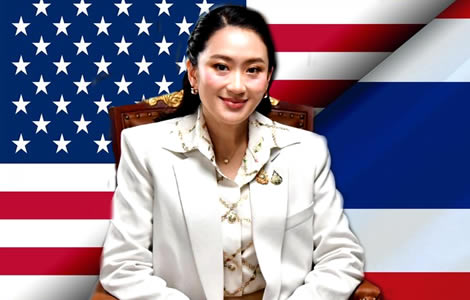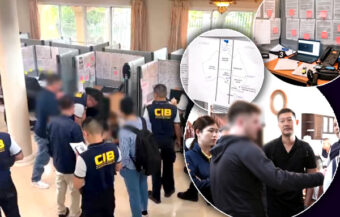Thailand under fire as PM Paetongtarn teases ‘secret deal’ with US amid stalled talks, rising tariffs, and growing pressure from rivals. As China warns against siding with Washington, critics warn against secrecy as industry demands clarity and swift action.
On Sunday, during her televised address to the Thai nation, Prime Minister Paetongtarn floated the idea of a ‘secret deal’ with the United States on trade tariffs. The proposal followed a week in which her government appeared somewhat inconsistent. Talks scheduled for April 23rd were previously cancelled for the second time, fuelling uncertainty. Thailand currently remains the only major economy in Asia yet to engage in substantive negotiations with US trade representatives. On Sunday, the Prime Minister’s only firm commitment was that discussions would begin within the 90-day deadline. She added that her government was seeking an outcome that would be a ‘win-win’ for both Thailand and the United States.

The revelation by Prime Minister Paetongtarn Shinawatra that Thailand is negotiating a “secret deal” with the United States is drawing a mixed response. On Sunday, in her ‘Empowering Thais’ broadcast, the PM made the claim. She indicated that Thailand is negotiating with the Trump administration through back channels. In addition, a secret deal might emerge from these negotiations.
Significantly, she suggested that the outcome of these talks may not be made available to the public. “It is likely to be a private agreement, and we are discussing the details of what it might achieve, and how flexible it could be,” PM Paetongtarn said.
Paetongtarn claims talks with the US are confidential to avoid regional disruption and global scrutiny
“However, any secret collaboration cannot be disclosed as other countries which are in talks with the US will know and comparisons will be made and turmoil will follow.”
“Every country in bilateral talks with the US, including Thailand, is trying to strike secret deals with the US, and this is not a bad thing. Every country is also doing things this way, but they just don’t speak about it out loud,” Ms Paetongtarn said.
The 36% tariff increase on Thai exports—postponed by Washington for 90 days—adds urgency to these talks. Thailand’s annual trade surplus with the United States stands at US$45.6 billion. Indeed it is the kingdom’s largest export market.
Last week, on Tuesday, Ms Paetongtarn suggested that ASEAN might be used by Thailand to negotiate a deal with the United States on a bloc basis. Later, Deputy Prime Minister Phumtham Wechayachai expanded on this to suggest that ASEAN may engage with US negotiators to agree on specific red lines.
Now, however, the Thai government has been criticized for being too slow in managing United States trade talks. A second meeting with the United States, scheduled for Washington on April 23rd, was cancelled.
Trade talks with the US stalled again as Thailand criticised for slow response and diplomatic confusion
Officials reportedly advised postponement to review new US demands.
Former Premier Thaksin Shinawatra on April 26th revealed that the United States has raised lawsuits against US nationals in Thailand. Last week, the Article 112 lese-majesté case against US academic Paul Chambers was dropped.
However, in recent days, it has come to light that his visa has been reviewed. Unable to obtain employment after being fired from Naresuan University, his future in Thailand is certainly in question. Indeed, he faces deportation from the kingdom where he has lived since 1993.
Thailand presently faces a 36% reciprocal tariff rate but is already subject to the baseline rate of 10%. Notably, a loophole allows many goods not to be impacted until May 27th. This is if they have been in transit. The Thai tariff is lower than Vietnam’s at 46% and higher than Indonesia’s at 32%.
The delay in Thailand’s response has alarmed business groups. Many SMEs worry the kingdom could miss its chance to secure exemptions or delay measures.
Right now, both Vietnam and Indonesia are scheduled to secure a trade pact with the United States in June. That is well before the 90-day pause expires on July 8th next.
Visa case, rising tariffs and SME pressure intensify calls for Thailand to act before the July 8 deadline
Meanwhile, Thailand has not yet set a date for talks. On Sunday, all Prime Minister Paetongtarn would say was that he was being briefed by Deputy Prime Minister Pichai Chunhavajira, who is leading the Thai negotiation team. Mr. Pichai, the Minister of Finance, has previously emphasized the value of not being too eager with these talks.
Still, insiders say the talks must deliver more than just optics. The US wants clear and tangible commitments.
Meanwhile, Prime Minister Paetongtarn has still failed to give a date for future US–Thai talks.
“The talks will take place within the [90-day] time frame,” she assured her viewers. Certainly, this is in marked contrast to Thailand’s competitors in Asia.
Before this, on Thursday, April 24th, former Premier Thaksin Shinawatra made a particularly interesting speech to American businessmen in Bangkok. The event was also attended by Robert F. Godec, the American ambassador.
In it, he suggested that Thailand is ready to enter into deals with the United States. Indeed, he questioned the country’s industrial policy set by various governments over the past two decades, particularly the junta regime since 2014.
No firm timeline set as insiders and US call for substance over symbolism in trade negotiations to achieve balance
Thailand has become increasingly engaged with China. During his speech, Mr. Thaksin mentioned Chinese EV cars, which are seen as both a blessing and a curse for the Thai economy.
These vehicles flood the market, threatening domestic manufacturing. Yet, they also tie Thailand’s economy closer to Beijing—making any pivot to Washington fraught with risk.
In effect, a readjustment of trade and industrial policy with a shift towards the United States and Japan may benefit Thailand. Presently, in every sector of the economy, Thailand appears to be losing out to Chinese interests and cheap imports.
Notably, this would only be a return to the situation that existed from the 1950s to the end of the 1980s, before Thailand drifted into China’s growing orbit — in particular after the 1997 Financial Crisis. Certainly, many Thai analysts believe back tracking on this is now unfeasible. Indeed, others argue for a bold new Chinese-led era.
However, some cabinet ministers, including Industry Minister Akanat Promphan, have openly referred to ‘zero dollar’ industries in recent weeks. This term is similar to ‘zero dollar’ tourism from China controlled by Chinese interests, which has also impacted the kingdom’s foreign tourism industry.
Nonetheless, Thailand’s economy has become particularly tied to China. Indeed, it is also not clear whether there is political will for a US-Thai secret pact or otherwise.
Chinese EV imports challenge Thai industry as economic ties to Beijing now limit Bangkok’s trade freedom
China has already signalled displeasure. During his regional tour, President Xi Jinping urged Asian nations not to “please outsiders” at China’s expense.
On Monday, April 21st, the Commerce Ministry in Beijing echoed this. It warned countries in Asia about ‘pleasing’ the United States at China’s expense.
Afterwards, Prime Minister Paetongtarn Shinawatra warned that Thailand must maintain its neutral stance between the United States and China. Furthermore, she emphasised that the government must protect Thai-Chinese partnerships in both business and the sale of agricultural produce.
Balancing these ties will be delicate. Any visible tilt to Washington could hurt Thai exports to China, especially in agriculture.
At the same time, Thailand is still an official United States military ally, as is the Philippines. The latter, with its 17% tariff rate, stands to fare well in this trade war. Certainly, like Vietnam, the Philippines is set to overtake Thailand’s economy by 2028.
Indeed, on Monday, Vietnam signalled it was holding its projected growth rate in 2025 to 8%. This is despite the US tariffs. Previously, sources close to Vietnam suggested it was preparing for a 22–28% US tariff regime after negotiations.
As China warns against US alignment, regional rivals like Vietnam and the Philippines pull ahead to secure deals
Certainly, analysts see room for a deal on strong security and investment cooperation. There may also be an agreement on a gradual shift of emphasis back to Thailand’s former reliance on the United States and Western allies.
However, any secret deal is bound to be met with political resistance in Thailand, not to mention from China. One respected analyst in Bangkok this week was sceptical. Dr. Amorntep Chawala of CIMB Thai Bank saw the United States driving a hard bargain.
“If the deal the Prime Minister referred to has real value, there must be clear exchange conditions, such as the US receiving certain benefits in return, otherwise it will be difficult to achieve results,” he said.
Another aspect of this ongoing negotiation process is Thailand’s credibility, both with the United States and China. Ironically in its desire to balance its relationship with both, it may fall between the stools. Presently, there is a strong argument for a definite stance.
Analysts speculate that benefits for Washington might include digital service rules, cybersecurity cooperation or military procurement access — in addition, of course, to tariff adjustment and more US imports.
Analysts say the US wants tangible returns and warn of fallout if Bangkok fails to credibly define its position
In the meantime, a well-known lawyer specialising in international law accepted that such ‘secret’ deals are possible. However, Dr. Veerapat Pariyawong warned that there could be a political price to pay.
“Secret agreements like this do not violate international law. However, we must be careful about the internal political repercussions if they are seen as Thailand being too lenient,” he warned.
In the meantime, the Federation of Thai Industries (FTI) has said it expects any deal to be transparent so that stakeholders, including businesspeople, can assess the real impact.
The FTI also warned of fallout if the talks collapse. Tariffs on auto parts, garments, and processed food would hammer Thailand’s core exports.
Certainly, the comments by the Prime Minister and those earlier by her father Thaksin Shinawatra have sparked debate. It comes as Thailand’s government has been making painfully slow but still tangible progress in addressing household debt.
Legal and business leaders warn of secrecy fallout as FTI seeks transparency on trade impacts on companies
A survey this week among lower-paid workers showed improvements in financial precautions. However, the earthquake on March 28th and a decline in tourist numbers due to the kidnapping of a Chinese actor has begun to impact the economy.
The infiltration of Chinese-controlled firms and cheaper products is already triggering layoffs. This is particularly seen in the logistics and manufacturing sectors tied to export production. Indeed, at his time, nearly every sector of the country’s manufacturing economy is impacted,
Therefore, there are growing calls for a reappraisal of Thailand’s industrial and trade policies.
One academic calling for a fundamental reappraisal is Kiatanantha Lounkaew, an economist at Thammasat University. He has called for a completely new vision for the Thai economy. Instead of focusing on stimulating an economy already ravaged by structural problems, it is time to change course.
Layoffs, debt and falling investment fuel calls for bold reform of Thailand’s trade and industry model
Undoubtedly, any structural change to Thailand’s economy must involve an altered relationship with China. The old model of the past two to three decades has come to an end.
“Thailand lacks a long-term economic direction. The country’s economic discourse is limited to questions such as ‘How should we stimulate the economy?’ or ‘How can we increase exports?’ We should be asking ‘What should Thailand’s next-generation economy look like?'” said Mr. Kiatanantha.
China warns Thailand not to ‘please’ the United States at its expense. US trade talks again postponed
Industry Ministry task force hunts Chinese controlled recycling operations linked to collapsed tower
2025 Growth could be just 0.7% warns Krungthai Bank as PM grills Tourism officials on falling numbers
Phitsanulok Attorney General decides to drop charges against US academic Paul Chambers in case review
“If we truly want to move the economy forward, we need to stop using the word ‘stimulate’. Stimulus measures are for when someone is near death and needs CPR. You can’t keep resuscitating forever — eventually, it becomes ineffective. What we need is to rehabilitate the economy to make it resilient. This may not be politically popular at first, but in the long term, it will deliver real, tangible results.”
He also warned that reshuffling ministers without real reform would be futile. Voters want bold moves, not cosmetic changes.
Join the Thai News forum, follow Thai Examiner on Facebook here
Receive all our stories as they come out on Telegram here
Follow Thai Examiner here
Further reading:
Thaksin does not rule out joining talks in US as Thai team finalises plans. They fly out on Thursday
Trump’s remaking of World trade, if it works, will force Thailand to decide between the US and China


















